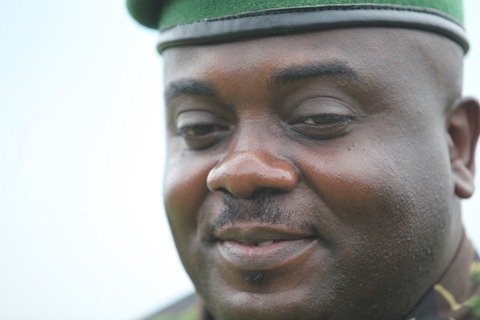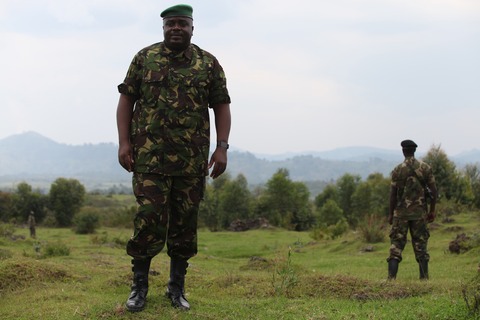Wednesday august 21 I had a 2-hour interview in Bunanaga with Bertrand Bisimwa, the political leader of m23. On our way home we stopped and took pictures of M23 rebels, hanging around the frontier between M23-country and FARDC/Monusco dominated ground. This was Kibati. Around five o’clock we were back in Goma. An hour later fighting began at Kibati.
On Thursday and Saturday bombs were thrown at Goma killing several children and civilians. FARDC accused Rwanda, Monusco said bombs were coming from M23, M23 accused FARDC.
On Thursday the special brigade (3.000 men) came in action for the first time. They have a special mandate to neutralize M23 rebels. They use heli’s, artillery: ‘Everything possible to eliminate M23’, according to Monusco’s chief general Stantos Cruz.
On Saturday, after a new bombardment on their town, angry people protested in the streets of Goma. One protester was killed.
Now on Monday fighting continues. It’s not clear how many people were killed and wounded up until now. FARDC, Monusco and the special brigade are trying to conquer the hill from which, according to them, M23 shoots at Goma with long-range weapons. It’s not clear if FARDC advances or M23.
This is a war which has been devastating East-Congo for almost 20 years in which more than 5,4 million people were killed. The biggest war since World War II.
People in Goma are dead scared. Will they be bombed today?
Find here a summary of the interview I had with Bertrans Bisimwa, only a few hours before the fighting started. I’ve left out the parts we talked about his past, Congo since 1994, CNDP, Bosco Ntaganda etcetera. This is a translation from French. And please have mercy; English is not my first language!

You say you want security in the region. But you choose to pick up arms. That seems contradictory.
We need an army to protect the population against Kinshasa. The government doesn’t want us to change things. When we asked in a memorandum to follow up the agreement of 23 mars 2009, they started to use violence against us. Kinshasa said, according to the agreement we were a political party with no longer the right to advocate a revolution. Either you bow or if not, we destroy you, said Kinshasa. They tried to chase our officers. They tried to murder our military chief Sultani Makenga. After the assault he went to the hills with 100 men. So we didn’t choose to pick up arms. We were forced. The international community kept silence at that time. They don’t understand much of what’s happening here. They say we’re criminals.
When we were in the hills, FARDC started the fight. We had to defend us. Civilians, who want to change things, act for reasons we understand. They have the right to defend themselves against the republic, because the republic has all the means to destroy them. The civilians will use the same methods as the republic as a consequence. That’s what we did.
By acting the way you did, you added to the insecurity in the region.
We protect and defend the people in the region we control. We want security and safety. Carrying arms doesn’t mean you add to the insecurity. But Kinshasa is painting a black picture of us. Accusing us of plunder, rape, murder.
But Kinshasa is not the only one. Human Rights Watch and the UN-expert group are accusing you as well.
Human Rights Watch is telling stories and is not scientific in their approach. They take witness statements by telephone. They pay women to tell stories about rape. They pay 40 dollars for transportation. Which poor woman wouldn’t want to earn 40 dollars? Neither Human Rights Watch nor the UN-experts came to see us here in Bunagana.
You were rather popular with parts of the population, until you took Goma. You were accused of rape, plunder, and murder. They say you left town, when there was nothing left.
I’m glad you ask this question. When we were IN Goma, nobody accused us of anything. It was only when we left Goma people started to accuse us. Before we left Goma we had two meetings with Monusco and one with CIRGL (Comité International sur la Region des Grands Lacs, a committee of the African Union, AV). We asked if there could come on paper a statement of how things were exactly in Goma. We didn’t want to be accused of all kind of things after we left Goma. But they said: just go, you did nothing wrong. We left. But it was no surprise that a month later a report was published that accused us of plunder, rape and murder. We don’t rape, murder or plunder.
But you have many soldiers. How can you know nothing happened?
I don’t say nothing happened. But it’s all about context. You have to understand there are ways to manipulate the public opinion, for example by using the poverty of the people.
The truth is, off course there are cases of undisciplinarial behaviour. We have a department looking in to those cases. We even have a code of good conduct. Our officers are not allowed to visit bars. So they don’t find themselves in a situation with women. When drunk they can easily become victim of a trap: a woman going with him voluntarily, but later accusing him of rape, and blackmailing him.
Nowadays Goma is not safe. We are not in Goma. So how can they accuse us?
It was M23 who opened the prison doors.
You are wrong. It was the FARDC who destroyed the prison. We were in Kibati. De prison was shelled with mortars. You can’t reach Goma from Kibati with mortars. (Remember, this conversation was before Goma was shelled).
In October 2008, when we were with Laurent Nkunda, we also came very close to Goma. We were in Kibati. But when they started to plunder Goma, we decided to stay away.
What happens when negotiations in Kampala fail?
That’s very bad news for the population. It’s like the sky falling down. We are doing all we can to make a success of the negotiations. We accepted to leave Goma, even though our soldiers shed a lot of blood, conquering the city.
Do you have a plan ready when negotiations fail?
No.
Now there is a special brigade with a special mandate: do all possible to neutralize M23. Are you afraid of them?
This is our home. We want changes, because living in these circumstances means convicting us to death. If they want to kill us, they can go ahead. At least we died for a just cause. The brigade exists of mercenaries. They fight for money, not for a cause.
If they decide to attack us, we have to defend ourselves. That’s war. In a war you can either lose or win. If we lose, FARDC and Monusco will take our territory and they will march over our dead bodies. If we win, we will take their territory. But we won’t march over their dead bodies. We will bury them. I won’t make threats, but once you’ve chosen your road, you have to follow it till the end. That’s war.
FARDC and Monusco have more soldiers and Monusco is much better equipped. Can you really win?
It’s not the numbers that count. Take Bunagana. FARDC was already gone, leaving Monusco to do the job. They only fought for a couple of ours before they had to leave their four bases. We are not afraid of mercenaries. They don’t want to die. Plus FARDC is in a bad condition. They are badly paid and badly housed. If they go to the front, they take their women and children with them. Do you think these soldiers want to fight? Do you think they want to give their lives for a government that don’t even appreciate their lives?
But there is another possibility: this war can become a regional war. Why do you think, the special brigade is formed by two enemies of Rwanda? Ask yourself that question!
People say you want to divide Congo, they accuse you of Balkanisation.
That is Kinshasa propaganda. I don’t understand why we can’t talk about rebuilding East-Congo, I mean from Ituri to Katanga. This part of the country has suffered so much. If the government says this is a disaster-zone, its not balkanisation. If we talk about rebuilding East-Cong it suddenly becomes balkanisation. But that’s fine for me.
How’s DRC in 2023?
I see a safe East-DRC. I see an East-Congo with a lot of possibilities. I see an East-Congo ready to cooperate with countries in the same region.
To be continued …

Stills: copyright Anneke Verbraeken